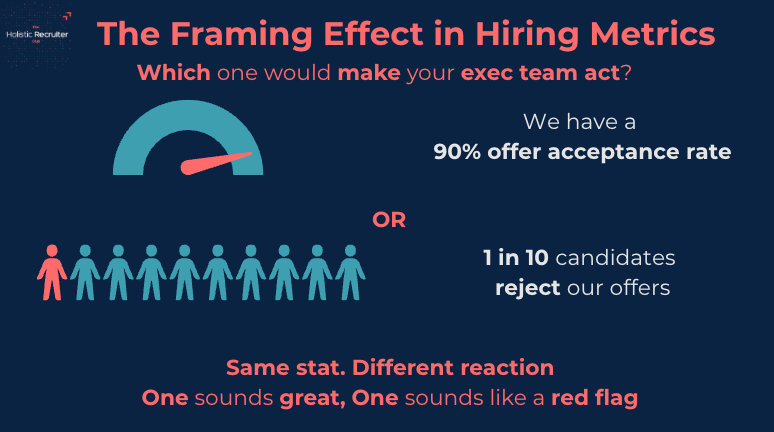Why Leadership Doesn’t Care About Your Hiring Metrics (But We Can Fix It)
This week in the Holistic Recruiter Club#032
Last week I asked you to add a “🧐“ if you read to a certain point in the newsletter and only one of you did and I’m sure that’s because he was being nice haha.
So what do I need to do to get you lot to engage in the comments?
Over 120 of you are reading this every week, but barely anyone jumps in.
What’s stopping you?
Genuinely, tell me I want to improve it:
What works well?
What do you want more of?
How do you want to participate?
No French lesson story this week (I’m slacking), but I do have a little slice of life from the French Countryside, oh and this is the funny of the week, I don’t need any memes after this story… 😂
6:20am. My 2-year-old bursts into our room as Super Maman’s leaving for Paris. He climbs into bed, drinks some “d’eau qui pique” (sparkling water to us English speakers), then decides to pour half a litre of it directly onto the bed. Cheers, mate. 👍
That got me up.
We head downstairs have breakfast and off they go to pla, and a few minutes later….
“Daddy, Georgie’s vomited.”
Our working cocker spaniel had, of course, managed to do it not on the easy-to-clean tiles, but squarely on the only rug in the house.
Fine, no problem calmly I go to get the steam cleaner out, products ready,
and then I hear:
Whilst gagging my 2 year old says “Daddy! Georgie’s eating the vomit!” and then my son preceded to be sick him self, I mean I was almost sick myself
Now as I come back to write this there is me left questioning all my life choices… and it’s not even 8am.
Isn’t working from home just the dream? Anyone else relate?
3 Psychology Tricks That Make Hiring Data Impossible to Ignore
Most hiring teams think if they report the right metrics, leadership will give a shit.
They won’t and they don’t care what you are showing them right now.
Do you know why? Because leadership are driven by psychology.
That’s why most hiring metrics fail to have an impact on leadership teams.
So you know this is called the holistic recruiter club for a reason,so I “borrowed” a few tricks from neuromarketing (yes, the stuff marketers use to sell you things you didn’t know you needed)…
And applied them to recruitment metrics.
I have 10 ideas but thought it was easier to share 3 psychological principles that can you help you influence your leaders
The first one is what we call Loss Aversion, and I wanted to start with this People are psychologically twice as motivated to avoid a loss than to achieve a gain.
The pain of losing something (time, money, talent) will be felt much stronger than the pleasure of gaining something (speed, new hire, small wins).
And to give you an example I wanted to show you this: -
• A lof of teams will frame things like this:
“Every extra day a role is open = €1,000 lost.” that there is classic loss framing → “vacancy is bad, fill faster.”
BUT THEN WHAT YOU NEED TO DO IS THIS…
The bigger, hidden loss is bad hires, turnover, retention problems, business disruption.
And what do I mean by that?
if you are obsessing open roles, it blinds leadership to long-term loss (churn, impact, wasted cost).
The point here is that you need to frame the metric as what is being lost and what inaction will lead to so they can feel it. Like lost time, revenue or productivity and instead of TA playing the victim you’re weaponising it to show business risk and impact.
The Effect of Framing. And you probably here this a lot that you can use the same stat to tell two different stories
Think about framing depending on what you want the outcome to be, for example if you want to create urgency, frame it to highlight the risks.
If you want reassurance to be your outcomes frame the progress.
Finally let’s talk about anchoring Bias
I mean this is a lesson I learnt a long time ago, It’s not about hiding the bad news. I’ve done it and I’m sure you have. It’s about controlling the story, so data drives the action you want/ need.
What I recommend is not just throw numbers at the leadrships team’s table.
Choose the anchor that steers them where you need!
Basically, what I’d like you to take away from this is
Hiring metrics can’t just be shared to show how amazing you are you should be using them to drive impact, repeat good things and highlight others that need improving.
So to wrap this up metrics are tools to influence human behaviour. So if you can get the psychology right, and leadership won’t ignore them.
Hope you found this useful!
Recruitment Campaigns You May Not Have Seen Before
This week I wanted to share campaigns that have collided between Marketing, Politics, and Recruitment.
This is super on topic this week as they are both stories
Both campaigns come from the U.S. Army.
Both tell a story.
Both have the same goal: recruitment and hiring people.
But they couldn’t be more different in tone.
The first was back in 2021, when the U.S. Army launched an animated recruitment series called “The Calling.” What they did was five video of five personal stories, spotlighting real soldiers from diverse backgrounds.
The most talked about one was Emma’s Story – her story was of a soldier raised by two mothers, focused on empathy, identity, and inclusion.
I think the message they were going for was
“This is a place for everyone.”
But now we fast forward to today…
The U.S. Army has taken a hard U-Turn
There is no softness no animations just a simple message
”Stronger people are harder to kill.”
Watch it below
So there are two stories
The first is appealing to identity and belonging.
The other appeals to strength and survival
They shifted like the wind with a new political climate and changed who they are targeting.
My question for you is:-
What narrative are YOU leaning into?
And more importantly
Is it still working for the talent you want to attract?
Thanks for reading this week ladies and gents :) I appreciate all your support and the private messages I get it means a lot, but now get on the comments and lets talk togeher you are all curious humans and following my content means you have stuff in common so lets go! :) Have a jolly lovely weekend. or week depending on when you are reading this!







